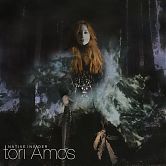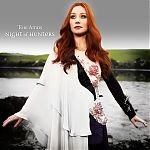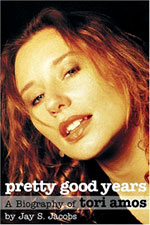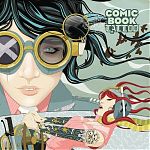- Articles
- Cherries
- Minutiae
- Q&A
- RAINN
- Releases
- Reviews
- Site News
- Them
- Toriphiles
- Touring
- TV/Radio/Web
- Video
News Archives
Keep an eye on our Twitter and Facebook pages since we often post quickie updates there when we're on-the-go.
During tours, we do our best to cover setlists in real-time on Twitter. If you want to tweet a show in, just DM or @ us on the day and tell us to watch your stream that night.
Tori is touring in 2017 to support the release of Native Invader. The European legs runs from early September through early October and the North American leg runs from late October to early December. We do not know if additional dates elsewhere will be added.

Native Invader (album, 2017)

Unrepentant Geraldines (album, 2014)

Gold Dust (album, 2012)

Night of Hunters (album, 2011)

Midwinter Graces (album, 2009)
 Abnormally Attracted To Sin (album, 2009)
Abnormally Attracted To Sin (album, 2009)
Live at Montreux 1991/1992 (DVD, 2008)

American Doll Posse (album, 2007)

A Piano (boxed set, 2006)

Pretty Good Years
(bio, 2006)

Fade To Red
(DVD, 2006)
 Comic Book Tattoo (book, 2008)
Comic Book Tattoo (book, 2008)News: Vancouver Sun Interview (December 7, 2011)
We were creating a new being together and having a love affair. My husband would say, ‘Why don’t you come in from the deck; it’s nine o’clock at night.’ I’d say, ‘I’m with the dead guys,’ and he’d say, ‘They better stay dead, wife.’
The Vancouver Sun’s Erika Thorkelson interviewed Tori and the resulting article appeared in the December 7th edition of the paper. Their discussion focuses mostly on Night of Hunters: its origins, how its pieces came together, working with her family to produce the record and working with the string quartet with whom she is touring to the support the album.
Thanks to George for the link!
Amos gets cosy with the classics
Long-dead composers inspired pianist-singer as she put together song cycle for 12th album
By Erika Thorkelson, Special To The Sun
Tori Amos has been spending a lot of time with older men lately. Her 12th album, Night of Hunters, is a song cycle based on 200 years of classical music for piano, and writing it required that she get intimate with composers like Schubert, Bach and Debussy.
Speaking from Florida during a brief break from a tour across Europe, South Africa, the United States and Canada, Amos remembers the process of composition as a collaboration with some of the greatest names in classical music. “We were creating a new being together and having a love affair,” she says. “My husband would say, ‘Why don’t you come in from the deck; it’s nine o’clock at night.’ I’d say, ‘I’m with the dead guys,’ and he’d say, ‘They better stay dead, wife.’ “
The cycle of 14 songs began as the brainchild of Alexander Berg, a doctor of musicology with classical label Deutsche Grammophon. He approached Amos while she was on the road with the idea to do a 21st-cen-tury song cycle based on classical themes. Amos remembers, “I looked at him and said, ‘Would you consider a drink first? That is a tall order.’ “ The commission was a far cry from anything Amos has done in the almost 20 years since Boys for Pele pounded its way into the hearts of tortured youths all over the world. Amos’s classical music education reputedly ended at 11 years old when she was kicked out of the prestigious Peabody Institute for being too stuck on pop music, so she had to start by researching what a song cycle was. She learned that it required a narrative that was tighter than a concept album, but more about poetry and mythology than most musicals.
Once she got a feel for the style, she realized she needed to choose a place to set the story. “Not some Austrian hill country, but some place that I knew, that I had a relationship with,” she says. “I’ve spent quite a bit of time in Ireland and I’ve always loved Irish mythology, so that was my guiding light.”
The narrative developed as Amos worked through the deluge of songs that her German musicologist sent, but didn’t really click until she encountered Andantino from Piano Sonata in A major D 959 by Franz Schubert. Its haunting opening notes gave birth to the moody bass at the beginning of Star Whisperer and the album began to come together.
The cycle tells the story of a woman named tori who is grieving after a terrible upheaval in her relationship with an unnamed lover. The small-t tori is visited by Annabel, a creature that shape-shifts between a goose and a fox. In Battle of Trees Annabel takes tori back to ancient Ireland where she and her lover were once poet warriors on the same side of a great battle and a journey of self-discovery begins.
The moral, inspired partly by her relationship with her recording engineer husband Mark Hawley, is far more measured than her earlier work. “I thought it was important that it wasn’t about who was right, the man or the woman,” she says. “They both need to see their part in why things are where they are. Until couples can do that, there’s no way that you’re going to see the gold in the relationship.”
For Amos, finding words to fit the modern-classical fusion was the most difficult part of composing the cycle. “You don’t really want to hear, ‘Baby, you’re a firework’ to a Bach prelude and fugue. It’s just not a good marriage,” she says. “I went back and read a lot of Irish poets from the 19th century and the early 20th century just to get a sense of the syntax, the rhythm, the language they were using. After having read them, though, I realized that was too formal, that this has to work in a 21st-century context as well. People have to be able to understand it.”
To develop Annabel’s character, Amos enlisted her daughter Natashya, who was 10 at the time.
“She asked endless amounts of questions,” Amos recalls, “like, ‘Why don’t grown-ups listen to children and why don’t they solve their problems until it’s too late?’ “ Natashya even sings Annabel’s part on a few of the songs. Her surprisingly strong voice mixes her mother’s sound with a hint of Joanna Newsom. Amos’s niece, Kelsey Dobyns, also appears in the cast.
“I’m not an actress so since I was playing the protagonist, I needed to make sure that I was playing off a real emotion, a real connection,” Amos says about the choice to involve her family.
The result is a complex, strange, often beautiful work that blends the fantastical with the mundane in classic Amos style – this is the songwriter, after all, who once wrote that in heaven, Confucius does his crosswords with a pen.
Amos is known for her intense, sweaty double-piano live performances, but for this tour she has decided that an ensemble would better fit the song cycle format. Each date will include a selection of her hits reimagined for her new band, a string quartet of young men from the Vienna Conservatory.
“They are classical musicians – they are not pop musicians – and their world is classical music,” Amos says. “So for them to be playing pieces from my catalogue, Precious Things, stuff like that – it’s really exciting to see the two worlds come together.”
Twenty years ago, Tori Amos brought the piano back to rock music. She showed that if played with enough force and abandon, it could be as powerful and mean as any electric guitar. Now, with Night of Hunters, she’s returning to the instrument’s roots by breathing new life into the work of some very old men.


